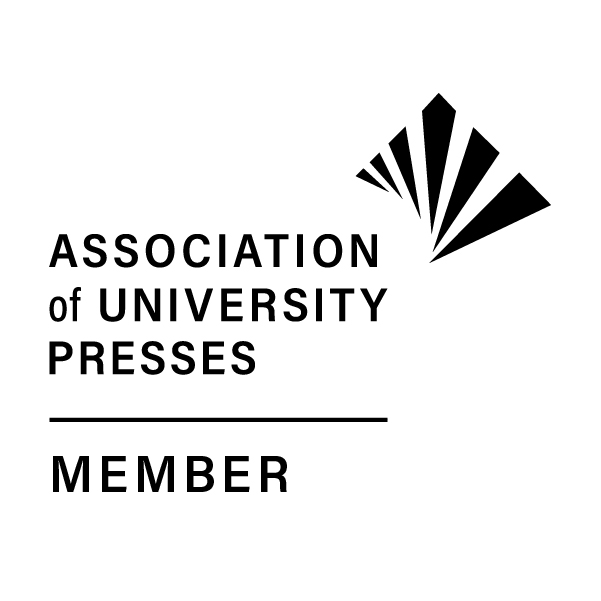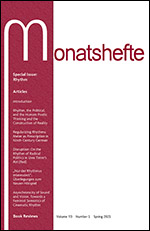|


|

Subscribe
Read the Journal Online
Submission Guidelines
Editorial Board
Receive Email Updates
Advertise in Monatshefte
Indexes/Abstracts
Current Issue TOC
Back Issues TOC
Monatshefte 2022 Subscription Rates
Institutions:
print & online $271
online only $233
Individuals:
print & online $103
online only $86
Non U.S. Postage (no postage charges for online-only subscriptions)
Airmail: add $40/yr.
Canadian Subscribers: add 5% GST. |
Monatshefte
Volume 93, Number 2, Summer 2001 Table of Contents
Texts and Documents
Kevin Perryman
Drei neue Variationen über alte Themen
Kevin Perryman, born in Colchester, UK, in 1950, has been active as a poet, translator, and editor, writing and publishing in German as well as in English. Among other things, he can take credit for no fewer than five volumes of poetry, again both in German and English. In 1996, Perryman, who has lived in Southern Germany since 1973, was awarded the “Horst Bienek Förderpreis für Lyrik der Bayerischen Akademie der Schönen Künste.” His “Drei Gedichte” are published here for the first time. (RG) (In German)
Articles
Thomas Baginski
Traumerfahrung als Erkenntnisweg: Oskar Loerkes Gedicht “Die Hand”
Abstract:
Although Oskar Loerke’s oppositional, anti-fascist poems still occasionally receive critical attention, his visionary, introspective poems have all but been forgotten. Using the dreamscape evoked in the poem “Die Hand” as a point of departure, this article seeks to discredit the notion often held by critics that the psychological imagery of Loerke’s verse frequently illustrates the base, irrational, even diabolic contents of the subconscious mind. This critical reading proposes, to the contrary, that the dream vision in “Die Hand” serves rather as a poetic device through which Loerke reflects on the various modes of perception and paths of cognition which lead to eventual self-knowledge and artistic self-actualization. In both content and form, the poem examines three mental states—the conscious, the pre-dream, and the dream state—and their respective modes of perception at work within the poet’s creative universe. (TB) (In German)
Yahya Elsaghe
Die Jüdinnen in Thomas Manns Erzählwerk
Abstract:
The Jewish figures in Thomas Mann’s literary oeuvre are indicative, in both their distribution and their respective sets of characteristics, of the catastrophic caesura encompassed by this œuvre. Their distribution, i.e., the absence of Jewish characters in texts conceived after World War II, reflects with uncanny accuracy the genocide committed during the Third Reich. The previous shaping of Jewish characters, especially of the female ones, from “Der Wille zum Glück” to Doktor Faustus sheds light on a shift from an anthropological to a cultural conception of Jewishness. The latter conception is imbued with grief and melancholy, whereas the former is defensively dominated by a fear of total assimilation facilitated by women’s legal right to assume non-Jewish names by marrying into the ‘German’ community. Vis à vis this legal option, the representation of young and sexually attractive Jewish women disproportionately emphasizes the stereotypical markers of physical alterity. (YE) (In German)
Marcus Bullock
In a Blauer Reiter Frame: Walter Benjamin’s Intentions of the Eye and Derrida’s Specters of Marx
Abstract:
Although Walter Benjamin presents many remarkable ways to approach visual modes of experience, his writing usually discusses paintings only in a very general manner. We find little direct discussion of how he himself contemplated particular paintings except for some remarks made in letters to Gershom Scholem concerning an exhibition of work by the Blauer Reiter group in 1921. These comments prove quite valuable in clarifying our understanding of how he moves between questions of meaning in the framed painterly production, and in the visual spectacle of history. Benjamin’s eye, penetrating its object to search out the substance of truth, provides a provocative contrast with the manner in which Derrida plays out his perspective over the spectral qualities of political forces, especially where Derrida’s account of Marx draws directly on Benjamin’s notion of messianism. Certainly, this contrast offers a useful insight into the distinction between deconstruction and Benjamin’s critical strategies. (MB)
Hans-Bernhard Moeller
Zur deutschen Filmkomödie der Generation nach 1968
Abstract:
This article deals with the aesthetics, strategies, and traditions of recent German films. It proposes that the contemporary German screen comedy is closer to its American genre counterpart than it is to the 1930s and 1940s UFA comedy. Core distinctions are modified visual approaches, subgenres such as the road movie which evolved in the wake of rapid technological progress, and the realignment of interpersonal relationships, the fallout of social change. Crises of personal identity frequently generate the filmic morphology of these comedies. An analysis of Rainer Kaufmann’s Stadtgespräch (1995) arguably offers a paradigm to validate our premises. What sort of realistic future can one expect for such German film comedies, particularly with regard to their prospects for European and international distribution? How can a film-production system survive in Germany if it does not support a lively comedy genre, especially at a time of commercial restructuring? (H-BM) (In German)
Berit Balzer
Geschichte als Wendemechanismus: Ein weites Feld von Günter Grass
Abstract:
This article deals with a mechanical object used by the author as a central narrative device. The person elevator functions in this novel as a means for promoting and demoting historical grandeur as it depicts well-known personalities by bits and pieces. Thus, the evolutionary forces of a reunified Germany are seriously questioned. Grass pleads for slowing down the pace of events, especially because the sediments of recent times—Prussian and Nazi strife for political and economical power—are not yet wholly exploited. The hoist-shaped wheel of history and fortune, always returning to the same starting point, appears to take us nowhere. By organizing his narration around this symbolic object, Grass argues that historical writing may not further any progress but necessarily supplies us with knowledge about where we come from and who we are. (BB) (In German)
Book Reviews
Books Received
Notes
Monatshefte / Max Kade Institute Directory of German Studies 2000
Errata
|


